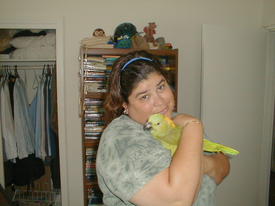Should I eat even if I am not hungry?

savimal
Posts: 37
Hello All
I have been targeting to net at 1200 calories every day. My food calories are targeted at 1500-1600 cals and exercise at 300-400 cals, so they tally up to 1200.
But on some days especially when I eat high protein even in small amounts, I feel very full and I end up netting at less than 1200 cals. For example todayI have eaten only 1100 calories and I burnt almost 350 calories in exercise, so to net at 1200, I need to eat back my calories. Even if I dont eat back my exercise calories , I am still under my goal of 1200.
I am really not suppressing hunger. I eat as soon as I feel the hit of hunger and some days I only eat so much calories.
Any suggestions?
Thanks in advance
I have been targeting to net at 1200 calories every day. My food calories are targeted at 1500-1600 cals and exercise at 300-400 cals, so they tally up to 1200.
But on some days especially when I eat high protein even in small amounts, I feel very full and I end up netting at less than 1200 cals. For example todayI have eaten only 1100 calories and I burnt almost 350 calories in exercise, so to net at 1200, I need to eat back my calories. Even if I dont eat back my exercise calories , I am still under my goal of 1200.
I am really not suppressing hunger. I eat as soon as I feel the hit of hunger and some days I only eat so much calories.
Any suggestions?
Thanks in advance
0
Replies
-
I don't no matter how many exercise calories I have left over. You're gonna have members telling you about starvation mode....I just don't see the point of eating your exercise calories if you're not hungry.0
-
I eat according to the clock, not my body messages. My body is apparently kind of stupid, and seldom feels hungry. So I can go 2-3 hours past a meal time, and then my blood sugar drops low. So instead, I eat breakfast at 10 am, lunch at 1-1:30 pm, and dinner at 8 pm. You MUST fuel the machine if you're going to be healthy (and go to the gym).0
-
You know, that is a good question.
I struggle with this issue sometimes too. Most of the time I eat something anyway but sometimes I don't. For me, if I don't eat because I'm not feeling hungry, I might overeat later.
Sometimes, if I skip, the hunger hits me unexpectedly and then I make poor food choices. Defintely try to stay ahead of the game. Maybe if you're not hungry, make sure you have a back up plan when the hunger does hit.0 -
I don't no matter how many exercise calories I have left over. You're gonna have members telling you about starvation mode....I just don't see the point of eating your exercise calories if you're not hungry.
Same goes here----350 calories burned is fair enough---to not go into starvation---I exercise 40-50 mins, burn 300-400 calories and never eat them---don't look like I've been in starvation mode, now does it?0 -
Your net should stay above 1200/day that means that on an exercise day you are going to want 1200+ your workout cals if you are staying at that rate however if you are engaged in high intensity workouts I really recommend eating double the protein that mfp suggests as they recommend protein based on a sedentary lifestyle and not for those who workout hard. 1 gram/1lb body weight if you are working out really hard every day. 30g at breakfast to really get the metabolism off to a good start and around the same at each meal to keep that metabolism at its highest throughout the day. The ideal is to get as much nutrient rich foods into your diet for the least amount of cals, I also recommend spinach, broccoli, almonds, omega 3 tablets unless you eat a lot of fish and other great nutrient rich veggies to keep the machine burning at its max level to benefit you the most.0
-
I think the text book answer here is to eat little often. Extreme athletes and body builders eat according to the clock, like one of the previous posters had mentioned. If you are trying to build up serious muscle you have to fuel the body, however if you are looking to lose weight it is a different story altogether. The importance of eating in that particular situation is not so much to provide the body with fuel as much as it is to keep your blood sugar levels as even as possible throughout the day. This will lead to less lethargy, better workouts, and better sleep. The "starvation mode" argument is so varied some say it is based on daily calorie intake, some say it is based on weekly calorie intake...and Im not sure there is really any way to actually measure "metabolism rates." If we stick to the stuff we can measure...this being blood sugar....we know for a fact that the body operates more efficiently when these levels remain constant. So with that said, you should definitely plan for five meal times and if during one of those times you are not hungry, you dont need to eat a whole meal but at least eat part of it, maybe like the veggies or maybe a fruit, something that is going to keep those bs levels from dropping, which is why later in the evening you may feel REALLY hungry, or tired, or have a headache...0
-
Relying on hunger cues, especially in the beginning, isn't a very good strategy. Sometimes you'll feel starving, other times not hungry at all - but neither of these is reliable. Correcting poor eating habits is about more than eating healthy foods - it's about retraining the body and mind to send the proper cues and to recognize them. When you've had poor eating habits for a while, your body has adapted to that and is not necessarily sending the right cues.
This is one of the reasons MFP is a great tool. It will help you retrain your body/mind to recognize a healthy amount of healthy food. Planning is key. When you know you'll be working out, you need to increase your intake throughout the day. Don't wait until the end of the day and all of a sudden you're short on intake.
Try to plan ahead. When you do have an off day, just try to add a little bit of protein as an evening snack (yes, you can eat in the evening.)0 -
---don't look like I've been in starvation mode, now does it?
=] thanks for backing me up. And you LOOK FABULOUS by the way =]0 -
I also eat at scheduled times. breakfast at 7
snack 1030
lunch 12
snack at 230 or 3
dinner at 6.
I try not to eat after70 -
Hunger signals are subjective and your body will adjust the signals based on the amount of food you eat over an extended period of time. If you consistently eat less than you need you'll stop feeling hungry even though you're not eating enough. And if you're used to eating too much you'll feel hungry all the time if you start eating less than you're used to. The feeling of hunger isn't always a reliable judge of whether or not you need to eat more.
I can use myself as an example. When I first started here I was eating 400-700 net calories per day. I thought I was eating enough because I wasn't hungry very often. Once I started trying to eat the right amount of food, 2-3 times what I was used to, it was hard. I wasn't hungry and it felt wrong to force myself to eat so much. But after about a week of adding a little more food to each meal and trying to eat snacks I found I was hungry for the right amount of food.
Definitely try to eat more to meet your goal. After a little while your body will adjust to eating the proper amount of food and you'll be able to use your hunger signals as a better judge of when you need to eat. But you'll need to train yourself to get to that point.0 -
Thank you all for pouring in your thoughts. It helps a great deal
I also had a slight suspicion if I was entering my portion sizes correctly (I measure almost everything btw, atleast at the oz and cup level) especially because I felt so full. But I think I agree with all you about eating enough and training your body to eat the right kind of foods.
Thanks everyone.0
This discussion has been closed.
Categories
- All Categories
- 1.4M Health, Wellness and Goals
- 393.9K Introduce Yourself
- 43.9K Getting Started
- 260.3K Health and Weight Loss
- 176K Food and Nutrition
- 47.5K Recipes
- 232.6K Fitness and Exercise
- 429 Sleep, Mindfulness and Overall Wellness
- 6.5K Goal: Maintaining Weight
- 8.6K Goal: Gaining Weight and Body Building
- 153.1K Motivation and Support
- 8.1K Challenges
- 1.3K Debate Club
- 96.4K Chit-Chat
- 2.5K Fun and Games
- 3.8K MyFitnessPal Information
- 15 News and Announcements
- 1.2K Feature Suggestions and Ideas
- 2.6K MyFitnessPal Tech Support Questions








